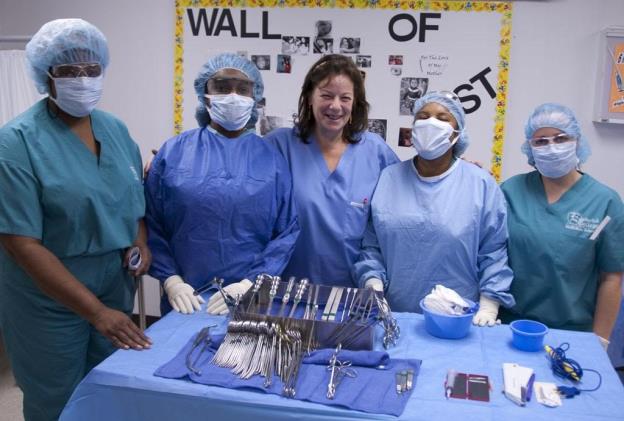Are you interested in a fast-paced, rewarding career in healthcare? Learning to become a surgical tech could be the perfect fit for you. Surgical technologists, also known as operating room technicians, play a crucial role in the operating room by assisting surgeons, preparing equipment, and ensuring patient safety during surgeries. This article will walk you through everything you need to know to become a surgical tech, from the required education to job responsibilities and career growth opportunities.
What is Surgical Tech?
Before diving into how to become a surgical tech, it’s essential to understand what the job entails. A surgical technologist assists in surgical operations by preparing the operating room, arranging equipment, and sterilizing instruments. During surgery, surgical techs provide the surgeon with instruments and supplies while maintaining a sterile environment.
Why Choose a Career as a Surgical Tech?
Becoming a surgical tech opens the door to a fulfilling career with many benefits. The demand for surgical technologists is growing due to the increasing number of surgeries and advancements in medical technology. Suppose you’re wondering how to become a surgical tech. In that case, it’s important to note that this profession offers job stability, competitive salaries, and the opportunity to work in various healthcare settings, including hospitals, outpatient centers, and even specialized clinics.
Educational Requirements for Becoming a Surgical Tech
Understanding the educational requirements is crucial to learning how to become a surgical tech. Most employers require at least a postsecondary certificate or an associate degree in surgical technology. Community colleges, vocational schools, and technical institutes offer accredited surgical tech programs.
Certification Options for Surgical Techs
After completing your education, the next step in how to become a surgical tech is obtaining certification. Although certification is not mandatory in every state, most employers prefer certified surgical technologists (CST). To become certified, you must pass an exam administered by the National Board of Surgical Technology and Surgical Assisting (NBSTSA) after graduating from an accredited program.
Skills Needed to Become a Successful Surgical Tech
Mastering the skills needed to become a surgical tech is critical to excelling. To become a surgical tech, you must have strong attention to detail, excellent hand-eye coordination, and the ability to work under pressure. Since surgical procedures can be high-stakes, surgical technologists must remain calm, focused, and quick to adapt to any situation.
Job Duties and Responsibilities of a Surgical Tech
Understanding the job duties is essential for anyone looking into becoming a surgical tech. Surgical technologists are responsible for preparing the operating room, ensuring all instruments are sterilized, and organizing supplies for the surgical team. During surgery, surgical techs provide the necessary instruments to the surgeon, maintain a sterile field, and assist with procedures such as suturing wounds.
Work Environment and Hours for Surgical Techs
When exploring how to become a surgical tech, it’s essential to consider the work environment. Surgical technologists work in hospitals, outpatient surgery centers, or physicians’ offices. The operating room can be a high-stress, fast-paced environment, and surgical techs must be prepared to stand for long hours and handle physically demanding tasks.
Career Advancement Opportunities for Surgical Techs
Once you’ve figured out how to become a surgical tech, you might wonder about career growth. Surgical technologists can pursue additional certifications or education to specialize in neurosurgery, cardiac surgery, or robotics. These specializations often come with higher pay and more responsibilities.
Salary Expectations for Surgical Techs
Salary expectations are crucial when considering how to become a surgical tech. According to the U.S. Bureau of Labor Statistics, the median annual salary for surgical technologists was $50,110 as of 2023. The type of healthcare facility, experience level, and location can all affect the compensation range.
Steps to Take After Graduation
After graduating from an accredited surgical tech program, the journey doesn’t end there. To officially become a surgica’l tech, you must gain hands-on experience and secure employment. Start by applying for internships or entry-level positions in hospitals or surgical centers.
Conclusion
For individuals who are interested in healthcare, being a surgica’l tech can be a fulfilling and stimulating career decision. This step-by-step guide on becoming a surgica’l tech outlines the essential educational requirements, certification processes, and skills needed to succeed. With the growing demand for surgical technologists and the potential for career advancement, now is an excellent time to start your journey. By following these steps, you’ll be well on your way to becoming a skilled, in-demand surgica’l tech and playing a vital role in the operating room.
Frequently Asked Questions (FAQs)
What is the duration of training to become a surgica’l tech?
The timeline for becoming a surgica’l tech typically ranges from 12 months to two years, depending on whether you pursue a certificate or an associate degree.
Do I need a degree to become a surgica’l tech?
While a degree is not always required, most employers prefer candidates with a certificate or associate degree in surgical technology from an accredited program.
Is certification required to work as a surgica’l tech?
Certification is not mandatory in every state, but it is highly recommended and often preferred by employers. The Certified Surgical Technologist (CST) credential is the most recognized certification in the field.
What are the job prospects for surgical techs?
The demand for surgical technologists is expected to grow, with the U.S. Bureau of Labor Statistics projecting a 6% increase in employment opportunities by 2031.
Can surgical techs specialize in certain types of surgery?
Yes, surgical techs can specialize in neurosurgery, cardiovascular, or orthopedic surgery by gaining additional training and certifications. Specialization often leads to higher pay and career advancement opportunities.

